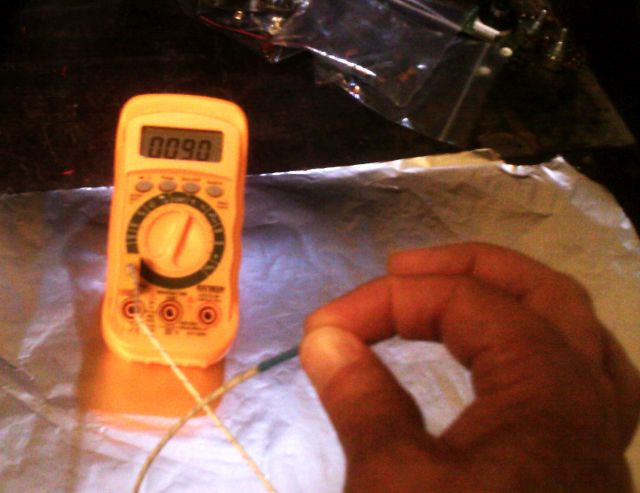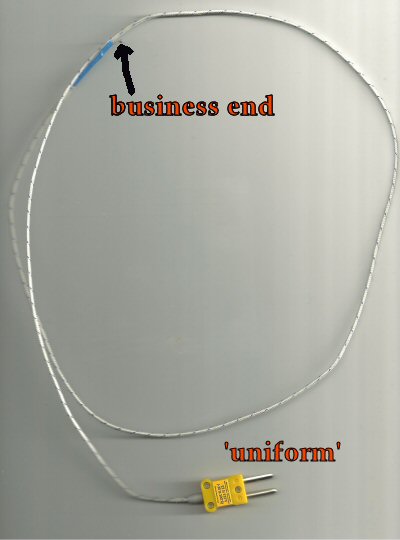Saturday, September 12, 2015
Nature is hard. Math is easy. 2
Carrying on from previous item.
Previous item was inspired by this:
 The VOM came from Jameco with a thermocouple and a temperature scale. I didn't notice the extra feature when ordering, so the TC was a sort of bonus. I've played with it when trying to make my air conditioner perform better on hot days, but I could have done that without the measurement. Here it shows that my fingers are 90 degrees F. Yeah, okay. Didn't need to know that.
Mainly the yellow plug triggered a long set of resonances in my old technician mind. One of the projects I worked on at Penn State involved a whole bunch of TCs, and they all had the same type of plug.
The VOM came from Jameco with a thermocouple and a temperature scale. I didn't notice the extra feature when ordering, so the TC was a sort of bonus. I've played with it when trying to make my air conditioner perform better on hot days, but I could have done that without the measurement. Here it shows that my fingers are 90 degrees F. Yeah, okay. Didn't need to know that.
Mainly the yellow plug triggered a long set of resonances in my old technician mind. One of the projects I worked on at Penn State involved a whole bunch of TCs, and they all had the same type of plug.
 The plug is like a uniform. It tells you what's on the 'business end' and what to expect. When you see this yellow plug, you know the business end is meant to measure temperature, and you know it's built to be calibrate-able. Even if the business end can't be physically reached (as was typical in those engineering experiments) you can have confidence in what the business end will do for you.
All analog components wear recognizable uniforms, with rank usually marked by text or color codes.
The plug is like a uniform. It tells you what's on the 'business end' and what to expect. When you see this yellow plug, you know the business end is meant to measure temperature, and you know it's built to be calibrate-able. Even if the business end can't be physically reached (as was typical in those engineering experiments) you can have confidence in what the business end will do for you.
All analog components wear recognizable uniforms, with rank usually marked by text or color codes.
 When you see the capacitor, you know by its appearance that it's a ceramic capacitor, which tells you something about its voltage limits and temperature limits. The label tells you its capacitance in picofarads. Thus you know its PURPOSE IN LIFE with considerable exactness.
When you see the resistor, you know by appearance that it's a metal-film resistor. The color code tells you it's a 330 ohm resistor with a tolerance or error band of 10%. (Most modern Rs are much closer than the nominal error band, but you're paying for a certain degree of quality control.)
If you need tighter precision or a non-standard value like 359 ohms, you can either do your own quality control ... buy lots of nominal 330s, test them until you find a 359 ... or you can pay a lot for a custom-made R.
IMPORTANT: THERE IS NO WAY TO HACK OR CORRUPT an analog component from a distance. It has no brain that can be propagandized. It will continue to serve its tightly defined little purpose unless it overheats or gets physically busted up. A digital component like a CPU is always incognito. Unmarked. Undercover. Kamikaze. It has no single defined purpose, and it can be subverted to serve any purpose without your knowledge.
= = = = =
The three quantities in previous rant: Money, Power and Morals, also have plugs or uniforms that reveal their purpose in life, when they're functioning properly. Unfortunately these components CAN be hacked, and HAVE BEEN thoroughly hacked by infinitely malicious hyperdemons who run the "enlightened parts" of the world. These three components no longer function properly.
The plug analogy fits Money and Morals, not so well on Power. Maybe I can come up with a better analogy later.
1. Money. In a metal-backed system each banknote is a plug.
When you see the capacitor, you know by its appearance that it's a ceramic capacitor, which tells you something about its voltage limits and temperature limits. The label tells you its capacitance in picofarads. Thus you know its PURPOSE IN LIFE with considerable exactness.
When you see the resistor, you know by appearance that it's a metal-film resistor. The color code tells you it's a 330 ohm resistor with a tolerance or error band of 10%. (Most modern Rs are much closer than the nominal error band, but you're paying for a certain degree of quality control.)
If you need tighter precision or a non-standard value like 359 ohms, you can either do your own quality control ... buy lots of nominal 330s, test them until you find a 359 ... or you can pay a lot for a custom-made R.
IMPORTANT: THERE IS NO WAY TO HACK OR CORRUPT an analog component from a distance. It has no brain that can be propagandized. It will continue to serve its tightly defined little purpose unless it overheats or gets physically busted up. A digital component like a CPU is always incognito. Unmarked. Undercover. Kamikaze. It has no single defined purpose, and it can be subverted to serve any purpose without your knowledge.
= = = = =
The three quantities in previous rant: Money, Power and Morals, also have plugs or uniforms that reveal their purpose in life, when they're functioning properly. Unfortunately these components CAN be hacked, and HAVE BEEN thoroughly hacked by infinitely malicious hyperdemons who run the "enlightened parts" of the world. These three components no longer function properly.
The plug analogy fits Money and Morals, not so well on Power. Maybe I can come up with a better analogy later.
1. Money. In a metal-backed system each banknote is a plug.
 The shape and color tell you that a calibrated measure is at the 'business end', and the numbers tell you the value of the fixed measurement at the 'business end'. The 'uniform' also states that a direct wire leads to the 'business end', which was true but tricky. You're not really expected to trace the wire back to Fort Knox. The claim of exchange is meant to prevent people from actually exchanging all their banknotes for silver or gold, but even if they did just that, it wouldn't make a lot of difference. Physical currency is a tiny part of all transactions. Even in the 1880s when real gold and silver coins were active in an (appropriately!) bimetallic system, 95% of all transactions were by check or money order, 4% by paper currency, and less than 1% by actual metal. The proportion of checks (and electronic equivalents) is much larger now.
2. Power. Not a good analogy, but the best I can do. Each side created its plugs by sending spies and agents and propaganda into the other. For an American, Alger Hiss and Roy Cohn and Lee Harvey Oswald were some of the visible yellow plugs. For a Russian, jazz and Gary Powers were visible yellow plugs.
3. Morals. The church was the plug. When you saw this component:
The shape and color tell you that a calibrated measure is at the 'business end', and the numbers tell you the value of the fixed measurement at the 'business end'. The 'uniform' also states that a direct wire leads to the 'business end', which was true but tricky. You're not really expected to trace the wire back to Fort Knox. The claim of exchange is meant to prevent people from actually exchanging all their banknotes for silver or gold, but even if they did just that, it wouldn't make a lot of difference. Physical currency is a tiny part of all transactions. Even in the 1880s when real gold and silver coins were active in an (appropriately!) bimetallic system, 95% of all transactions were by check or money order, 4% by paper currency, and less than 1% by actual metal. The proportion of checks (and electronic equivalents) is much larger now.
2. Power. Not a good analogy, but the best I can do. Each side created its plugs by sending spies and agents and propaganda into the other. For an American, Alger Hiss and Roy Cohn and Lee Harvey Oswald were some of the visible yellow plugs. For a Russian, jazz and Gary Powers were visible yellow plugs.
3. Morals. The church was the plug. When you saw this component:
 you knew it was a Weigh Station for Morality. Its business end was God. When you walked through the component's door you could expect to see and hear representations of God's Law. The details of the representations told you the calibrated value and the error range. Some components were relatively sloppy, some were highly precise. After you became a regular user of the Weigh Station, you could also expect assistance in calibrating and adjusting your own Moral Weight.
= = = = =
**Footnote on (appropriately!) bimetallic: Bimetallism was a peculiar political rallying cry of Populists in the 1880s. It wasn't a workable system and wouldn't have solved any problems, but it was something to shout about. The equivalent in modern political currency is Flat Tax. I was just making a dumb pun on the basic construction of a thermocouple, but it raises a non-dumb possibility. In a money system with actual bimetallic coins, each coin could create its own little bit of real value. A stack of coins in your hot little 90-degree fingers would give a usable voltage, similar to the old Heatable Battery!
you knew it was a Weigh Station for Morality. Its business end was God. When you walked through the component's door you could expect to see and hear representations of God's Law. The details of the representations told you the calibrated value and the error range. Some components were relatively sloppy, some were highly precise. After you became a regular user of the Weigh Station, you could also expect assistance in calibrating and adjusting your own Moral Weight.
= = = = =
**Footnote on (appropriately!) bimetallic: Bimetallism was a peculiar political rallying cry of Populists in the 1880s. It wasn't a workable system and wouldn't have solved any problems, but it was something to shout about. The equivalent in modern political currency is Flat Tax. I was just making a dumb pun on the basic construction of a thermocouple, but it raises a non-dumb possibility. In a money system with actual bimetallic coins, each coin could create its own little bit of real value. A stack of coins in your hot little 90-degree fingers would give a usable voltage, similar to the old Heatable Battery!
 The VOM came from Jameco with a thermocouple and a temperature scale. I didn't notice the extra feature when ordering, so the TC was a sort of bonus. I've played with it when trying to make my air conditioner perform better on hot days, but I could have done that without the measurement. Here it shows that my fingers are 90 degrees F. Yeah, okay. Didn't need to know that.
Mainly the yellow plug triggered a long set of resonances in my old technician mind. One of the projects I worked on at Penn State involved a whole bunch of TCs, and they all had the same type of plug.
The VOM came from Jameco with a thermocouple and a temperature scale. I didn't notice the extra feature when ordering, so the TC was a sort of bonus. I've played with it when trying to make my air conditioner perform better on hot days, but I could have done that without the measurement. Here it shows that my fingers are 90 degrees F. Yeah, okay. Didn't need to know that.
Mainly the yellow plug triggered a long set of resonances in my old technician mind. One of the projects I worked on at Penn State involved a whole bunch of TCs, and they all had the same type of plug.
 The plug is like a uniform. It tells you what's on the 'business end' and what to expect. When you see this yellow plug, you know the business end is meant to measure temperature, and you know it's built to be calibrate-able. Even if the business end can't be physically reached (as was typical in those engineering experiments) you can have confidence in what the business end will do for you.
All analog components wear recognizable uniforms, with rank usually marked by text or color codes.
The plug is like a uniform. It tells you what's on the 'business end' and what to expect. When you see this yellow plug, you know the business end is meant to measure temperature, and you know it's built to be calibrate-able. Even if the business end can't be physically reached (as was typical in those engineering experiments) you can have confidence in what the business end will do for you.
All analog components wear recognizable uniforms, with rank usually marked by text or color codes.
 When you see the capacitor, you know by its appearance that it's a ceramic capacitor, which tells you something about its voltage limits and temperature limits. The label tells you its capacitance in picofarads. Thus you know its PURPOSE IN LIFE with considerable exactness.
When you see the resistor, you know by appearance that it's a metal-film resistor. The color code tells you it's a 330 ohm resistor with a tolerance or error band of 10%. (Most modern Rs are much closer than the nominal error band, but you're paying for a certain degree of quality control.)
If you need tighter precision or a non-standard value like 359 ohms, you can either do your own quality control ... buy lots of nominal 330s, test them until you find a 359 ... or you can pay a lot for a custom-made R.
IMPORTANT: THERE IS NO WAY TO HACK OR CORRUPT an analog component from a distance. It has no brain that can be propagandized. It will continue to serve its tightly defined little purpose unless it overheats or gets physically busted up. A digital component like a CPU is always incognito. Unmarked. Undercover. Kamikaze. It has no single defined purpose, and it can be subverted to serve any purpose without your knowledge.
= = = = =
The three quantities in previous rant: Money, Power and Morals, also have plugs or uniforms that reveal their purpose in life, when they're functioning properly. Unfortunately these components CAN be hacked, and HAVE BEEN thoroughly hacked by infinitely malicious hyperdemons who run the "enlightened parts" of the world. These three components no longer function properly.
The plug analogy fits Money and Morals, not so well on Power. Maybe I can come up with a better analogy later.
1. Money. In a metal-backed system each banknote is a plug.
When you see the capacitor, you know by its appearance that it's a ceramic capacitor, which tells you something about its voltage limits and temperature limits. The label tells you its capacitance in picofarads. Thus you know its PURPOSE IN LIFE with considerable exactness.
When you see the resistor, you know by appearance that it's a metal-film resistor. The color code tells you it's a 330 ohm resistor with a tolerance or error band of 10%. (Most modern Rs are much closer than the nominal error band, but you're paying for a certain degree of quality control.)
If you need tighter precision or a non-standard value like 359 ohms, you can either do your own quality control ... buy lots of nominal 330s, test them until you find a 359 ... or you can pay a lot for a custom-made R.
IMPORTANT: THERE IS NO WAY TO HACK OR CORRUPT an analog component from a distance. It has no brain that can be propagandized. It will continue to serve its tightly defined little purpose unless it overheats or gets physically busted up. A digital component like a CPU is always incognito. Unmarked. Undercover. Kamikaze. It has no single defined purpose, and it can be subverted to serve any purpose without your knowledge.
= = = = =
The three quantities in previous rant: Money, Power and Morals, also have plugs or uniforms that reveal their purpose in life, when they're functioning properly. Unfortunately these components CAN be hacked, and HAVE BEEN thoroughly hacked by infinitely malicious hyperdemons who run the "enlightened parts" of the world. These three components no longer function properly.
The plug analogy fits Money and Morals, not so well on Power. Maybe I can come up with a better analogy later.
1. Money. In a metal-backed system each banknote is a plug.
 The shape and color tell you that a calibrated measure is at the 'business end', and the numbers tell you the value of the fixed measurement at the 'business end'. The 'uniform' also states that a direct wire leads to the 'business end', which was true but tricky. You're not really expected to trace the wire back to Fort Knox. The claim of exchange is meant to prevent people from actually exchanging all their banknotes for silver or gold, but even if they did just that, it wouldn't make a lot of difference. Physical currency is a tiny part of all transactions. Even in the 1880s when real gold and silver coins were active in an (appropriately!) bimetallic system, 95% of all transactions were by check or money order, 4% by paper currency, and less than 1% by actual metal. The proportion of checks (and electronic equivalents) is much larger now.
2. Power. Not a good analogy, but the best I can do. Each side created its plugs by sending spies and agents and propaganda into the other. For an American, Alger Hiss and Roy Cohn and Lee Harvey Oswald were some of the visible yellow plugs. For a Russian, jazz and Gary Powers were visible yellow plugs.
3. Morals. The church was the plug. When you saw this component:
The shape and color tell you that a calibrated measure is at the 'business end', and the numbers tell you the value of the fixed measurement at the 'business end'. The 'uniform' also states that a direct wire leads to the 'business end', which was true but tricky. You're not really expected to trace the wire back to Fort Knox. The claim of exchange is meant to prevent people from actually exchanging all their banknotes for silver or gold, but even if they did just that, it wouldn't make a lot of difference. Physical currency is a tiny part of all transactions. Even in the 1880s when real gold and silver coins were active in an (appropriately!) bimetallic system, 95% of all transactions were by check or money order, 4% by paper currency, and less than 1% by actual metal. The proportion of checks (and electronic equivalents) is much larger now.
2. Power. Not a good analogy, but the best I can do. Each side created its plugs by sending spies and agents and propaganda into the other. For an American, Alger Hiss and Roy Cohn and Lee Harvey Oswald were some of the visible yellow plugs. For a Russian, jazz and Gary Powers were visible yellow plugs.
3. Morals. The church was the plug. When you saw this component:
 you knew it was a Weigh Station for Morality. Its business end was God. When you walked through the component's door you could expect to see and hear representations of God's Law. The details of the representations told you the calibrated value and the error range. Some components were relatively sloppy, some were highly precise. After you became a regular user of the Weigh Station, you could also expect assistance in calibrating and adjusting your own Moral Weight.
= = = = =
**Footnote on (appropriately!) bimetallic: Bimetallism was a peculiar political rallying cry of Populists in the 1880s. It wasn't a workable system and wouldn't have solved any problems, but it was something to shout about. The equivalent in modern political currency is Flat Tax. I was just making a dumb pun on the basic construction of a thermocouple, but it raises a non-dumb possibility. In a money system with actual bimetallic coins, each coin could create its own little bit of real value. A stack of coins in your hot little 90-degree fingers would give a usable voltage, similar to the old Heatable Battery!
you knew it was a Weigh Station for Morality. Its business end was God. When you walked through the component's door you could expect to see and hear representations of God's Law. The details of the representations told you the calibrated value and the error range. Some components were relatively sloppy, some were highly precise. After you became a regular user of the Weigh Station, you could also expect assistance in calibrating and adjusting your own Moral Weight.
= = = = =
**Footnote on (appropriately!) bimetallic: Bimetallism was a peculiar political rallying cry of Populists in the 1880s. It wasn't a workable system and wouldn't have solved any problems, but it was something to shout about. The equivalent in modern political currency is Flat Tax. I was just making a dumb pun on the basic construction of a thermocouple, but it raises a non-dumb possibility. In a money system with actual bimetallic coins, each coin could create its own little bit of real value. A stack of coins in your hot little 90-degree fingers would give a usable voltage, similar to the old Heatable Battery!Labels: 20th century Dark Age, defensible spaces, Metrology, Real World Math
